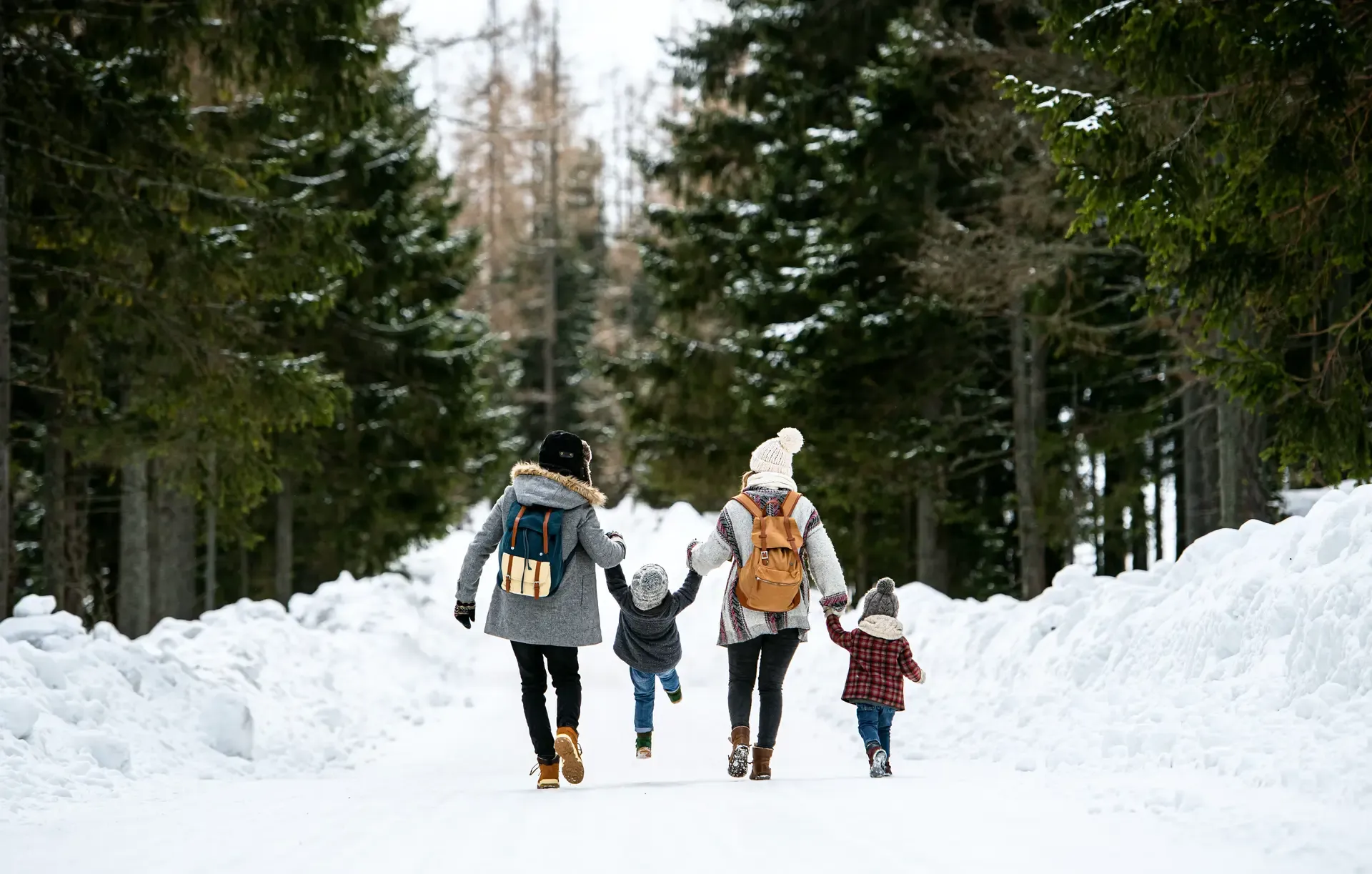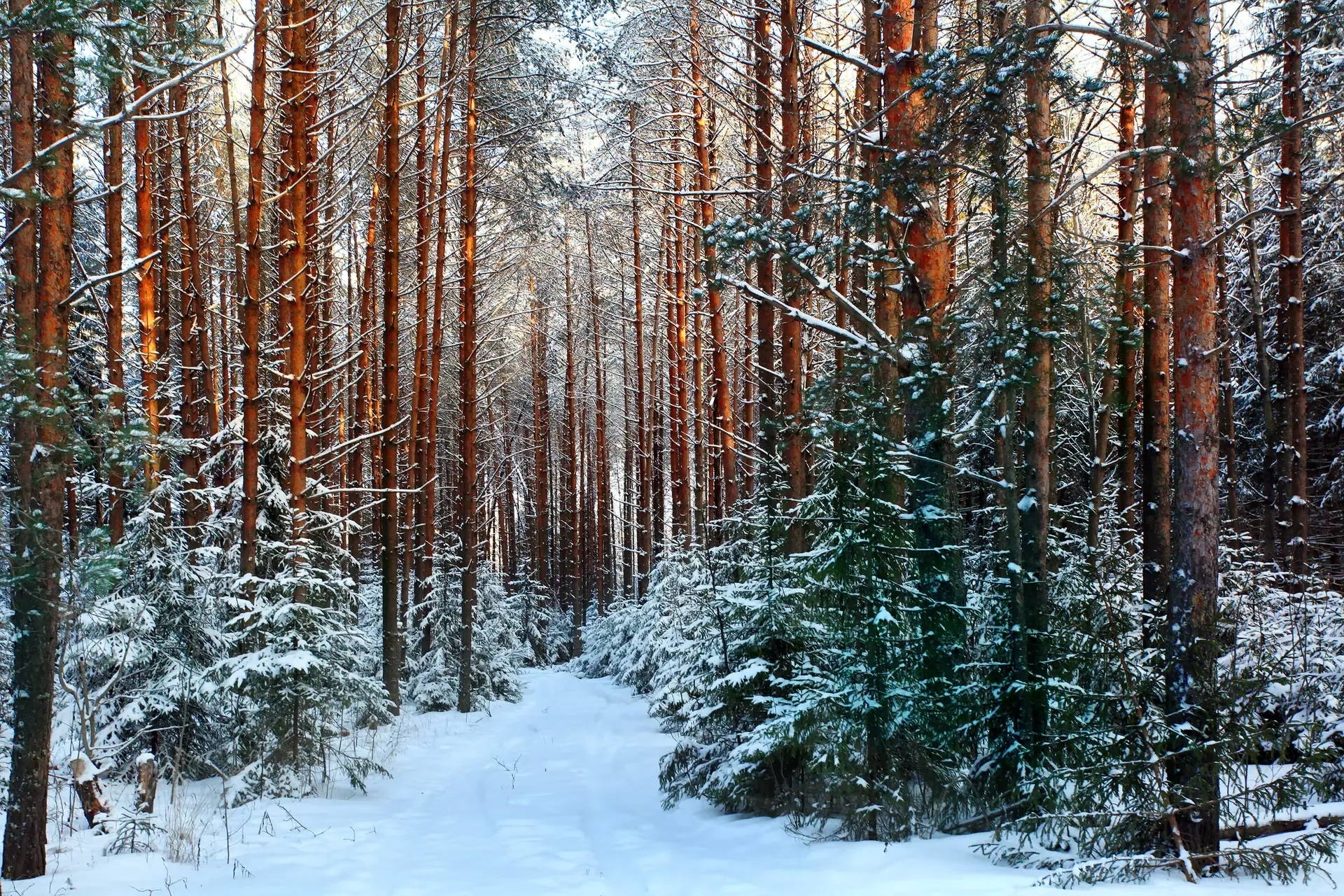We’re Making the Voluntary Carbon Market Work for Rural America

A snowy forest is illuminated by sunrise.
As a small forest owner and a conservation professional, my personal and professional lives constantly collide. And as the 28th United Nations Framework Convention on Climate Change Conference of the Parties (COP28) ends, I’ve continued to reflect on these interconnected worlds. I’m grateful to know that my organization, the American Forest Foundation (AFF), is representing the interests and potential of U.S. family-owned forests, like my own, and small land holders everywhere.
COP is an annual international climate summit, where world leaders, non-government organizations, and businesses gather to work together on solutions to tackle climate change. There are now 198 “parties” (197 countries plus the European Union) to the convention, constituting near universal membership. In 2015, COP21 led to the Paris Agreement, which mobilized global collective action to limit the global temperature increase to 1.5C above pre-industrial levels by 2100, and to act to adapt to the already existing effects of climate change. And every year, COP continues to be a meeting place focused on ideas and actions to continue improving the global effort to fight climate change.
As a non-profit organization, the mission of AFF is to drive meaningful conservation impact through market-based mechanisms—like the voluntary carbon market—that have the potential to unlock private and public investment in the health and resiliency of US family-owned forests. We speak every day for both the people and planet.

Family forest owners walk their land through snowy trails.
The past few weeks have been no different, as the AFF team had the privilege of representing small, private landowners at this year’s COP. Representatives from our team participated in a variety of panels and presentations. We spoke about how the voluntary carbon market must be supported by rigorous science to ensure they provide a true climate benefit; we covered the need for government support to help provide access and resources for rural Americans to get involved in programs that make a climate impact; and we presented on the overall power of forests, specifically small private American forests, as a key component in the global strategy for fighting climate change.
Forest landowners, like you and me, are on the front lines of some of the most telling climate change observations, from increased extreme weather events to early bud break. We see and live these phenomena every year. And we suspect there’s more our woods can do to ensure a more sustainable future.
Recently, AFF conducted a research survey polling landowners in the United States, and almost two-thirds (64%) of surveyed forest landowners say they want to take steps to help limit or mitigate the effects of climate change. Can you imagine the impact we can have collectively?
In the US, 39% of forests are owned by individuals and families like us. Yet, we often lack access to tools, resources—and most importantly—market opportunities to put these forests to work. That’s why AFF built our program, one that continues to grow and scale, to specifically work for small landowners and make a meaningful global impact. The Family Forest Carbon Program was made to increase access to market opportunities for small, individual landowners.
Just as you wouldn’t want to get involved with a program that doesn’t have real benefits, no country or company wants to invest resources in something that doesn’t ultimately make a difference. From our initial program design to the present, the Family Forest Carbon Program has made the strongest commitment to high quality, robust claims. We’ve led the development and validation of an innovative carbon accounting method and incorporated other program design elements that far exceed requirements from existing standard bodies. We’ve also made the bet that quality is of the utmost importance for the long-term durability of our product on the marketplace, not just to ensure the claims we make are meaningful, but also to further whet the market appetite for small landowner-produced claims.
While there’s more work to be done, and our program must continue to grow, we are seeing impacts already. Some of our enrolled landowners are seeing more wildlife return to their land. Others are using their payments to improve infrastructure on their properties that have protected it from severe storm damage. We’re thrilled to have enrolled close to 500 private landowners, representing about 70,000 acres of woods and close to $20 million dollars committed in annual incentive payments to landowners. Those numbers reflect over 1.25 million metric tonnes of carbon that will be sequestered over time. These are real figures that highlight the impact that forest landowners in the United Sates like you and I can make in the global fight against climate change. It can feel like a challenge, but what we do at home helps the entire planet.
At COP28, it became even more crystalized that nature is an indispensable element to avoiding climate catastrophe. Natural climate solutions, along with reducing emissions and technological advances, must be maximized to keep our planet from warming more than 1.5 degrees Celsius by 2030. And currently, the most viable option to maximize the climate potential of nature is through carbon markets, particularly through the use of nature climate solutions.
We’re not the only ones that see this. World leaders know it. This year at COP28, United States Special Presidential Envoy for Climate John Kerry, said, “I’ve become a firm believer, I wasn’t always a firm believer but now have become a believer in the power of carbon markets to drive ambition and action.” And EU President Ursula von der Leyen, and UN Executive Secretary Simon Stiell made it clear that if we are to achieve our ambitious global climate goals, that we must leverage carbon markets, especially the global voluntary carbon market. All of this emphasizes that the voluntary carbon market is here to stay. Forest landowners already enrolled in our program are at the forefront of these efforts, and those considering signing up can be as well.
I don’t have the biggest trees or the largest acreage. Neither do my neighbors. But together with my peer landowners and through programs like FFCP, we can make a meaningful difference for the planet and secure the resilient future of our own forested legacy.
And this time next year, when I watch my daughter collect her next round of fallen leaves and I reflect on the conversations at a future COP, I’ll remember just how much my little forest has done to sequester and store carbon and mitigate the impacts of climate change. The voluntary carbon market is here to stay, and I hope you’ll consider joining us at the American Forest Foundation and Family Forest Carbon Program, proving that together we, and our lands, are greater than the sum of its parts.
If you’re curious about the work we do and the Family Forest Carbon Program, learn more at familyforestcarbon.org. If you have 30 acres or more of wooded land, you may be eligible to enroll. We’d love to have you!
Related Articles

December 20, 2023
The Voluntary Carbon Market is Reawakening – Let’s Make 2024 A Year of Action
This year, AFF attended its second Conference of Parties, COP28, held in Dubai. COP28 define the voluntary carbon market’s role in the global struggle against climate change.

December 20, 2023
The Voluntary Carbon Market Is Here to Stay – Now Let’s Make It Work for Rural America
If there’s one thing to take away from COP28, it’s that nature is undoubtedly an indispensable element to avoiding climate catastrophe.

December 21, 2023
The Fight Against Climate Change Needs Nature
At COP28 earlier this month, the American Forest Foundation had the privilege of sharing our work with family forest owners to tackle climate change.